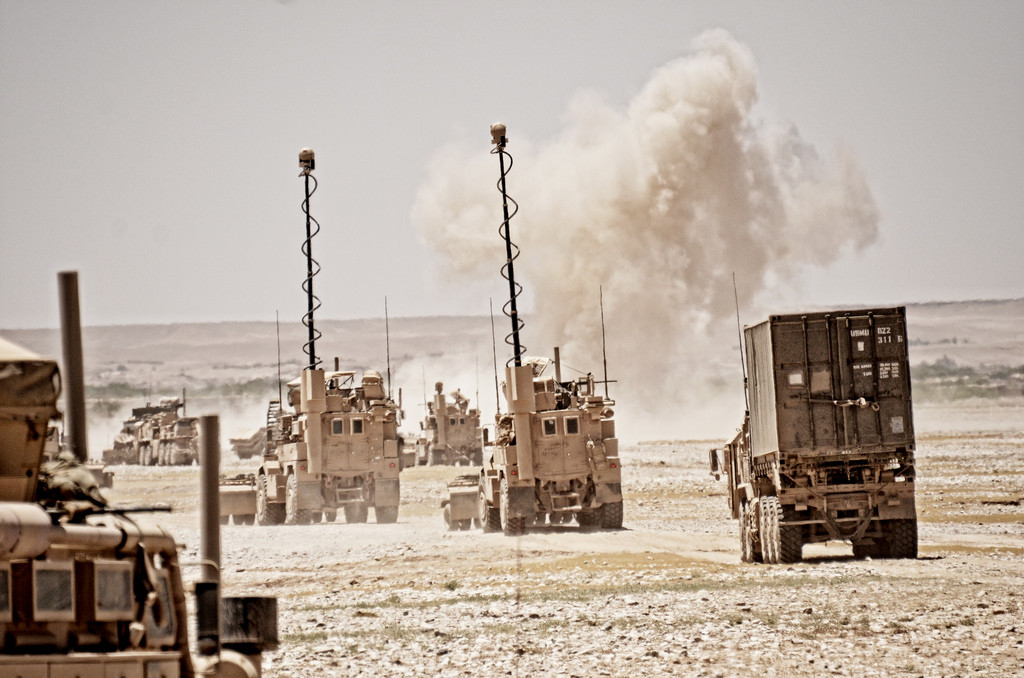From Point A to Point B: What Logies Know

Jeffrey Clement, The Lieutenant Don’t Know: One Marine’s Story of Warfare and Combat Logistics in Afghanistan (Havertown, PA: Casemate, 2014).
In 2008, at the edge of the empire in southern Helmand province, our outpost would receive chow and water once a week.
Once a week the radio watch would emerge from the makeshift Command Operations Center and announce to the two platoon position, known as Strongpoint Bravo: “Wagon Wheel’s coming.”
An hour later Wagon Wheel would emerge from the desert, thick plumes of sand kicking from the tires of MRAPs, Humvees and Seven Tons, yet intertwined in that wafting moondust was our hope for mail and Rip-Its we would drink to stay awake, Menu B MRE’s to field strip and pack for our patrols and maybe some bum-scoop about when we were rotating back to Kandahar.
And so it went for most of the deployment, with the resupplies blurring into a never-ending working-party of unloading palettes of MREs and milk-colored water purified at Camp Bastion.
But there was one time I remember, one time I can recall the driver of a seven-ton getting out of his truck in his perfectly clean utilities and a green skivvy shirt that read: “CLB [Combat Logistics Battalion]-24, You’ll Need Us, Before We Need You.”
It was an insult to the beloved infantry, a slight at our dependency on convoys and helicopters and a nod toward the fact that every Marine is a rifleman first.
It was a statement I revolted against until I read Jeff Clement’s book: The Lieutenant Don’t Know.
Clement reveals the reality of logistics in a detail that when juxtaposed with the infantry reveals striking similarities to the grunts, yet also portrays another layer of friction that is inherent with battlefield logistics, a layer that when understood truly made me appreciate the logistics battalion roll downrange.
Clement’s story is an ode to modern warfare as I have come to understand it, and reading his accounts of Afghanistan is as if I’m reading about my own deployments, albeit from an angle I had rarely considered. Clement writes of his time in training in the United States Marine Corps and his eventual combat deployment to Helmand Province, Afghanistan in 2010 with Combat Logistics Battalion-6.
Clement is a logistics lieutenant, and the title of his book humbles his narrative as it serves as a constant reminder to the fluidity of Afghanistan’s conditions and the ever-changing environment leaders need to adapt to in order to keep their men alive and their equipment running. Clement never pretends to know all the answers. Instead of taking aim and critiquing the macro-state of the war, he stays in his lane and tell his story genuinely, with prose that is easily digestible and engaging.
Throughout most of my time in the infantry, convoys and resupplies were a god-given right, but after finishing two hundred pages of this book, my perspective on logistics had permanently shifted. From maintaining convoy security, to the weight of a mine-roller, Clement does a fantastic job at keying the reader in on the scope of resupply operations in Helmand province and the sometimes-maddeningly slow pace at which these operations are carried out.
He also manages to put forth a realistic portrayal of combat. From RPGs at sunset to sitting in a MATV listening to the ricochet of AK rounds deflect off the hull, Clement pulls the reader in close. He does so particularly well with stories of the interactions between his Marines and the Afghans along his convoy routes. From soccer games with Afghan children and the inevitable “pen” donations, to downtime in the rear with his Marines, he gives a realistic portrayal of life in the mud. In the end, though, Clement makes you ask: why should anyone really care about the difference between the infantry and everybody else?
This is where Clement shines. He readily admits he’s no special forces operator or team member of Seal-Team Six; he is a logistics officer in our country’s longest running war to date, and his story is the story of so many that have come before him and that will come after.
Clement is the face of our war and his story is well told, and well worth the read.
Thomas Gibbons-Neff is a columnist at War on the Rocks. He served as an infantryman with 1st Battalion 6th Marines from 2007-2011 and participated in two deployments to Afghanistan. He is a student at Georgetown University and executive editor at The Hoya. Follow him on twitter: @Tmgneff.
Photo credit: Mark Stroud

